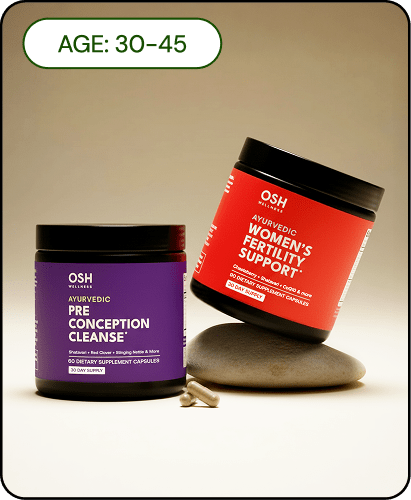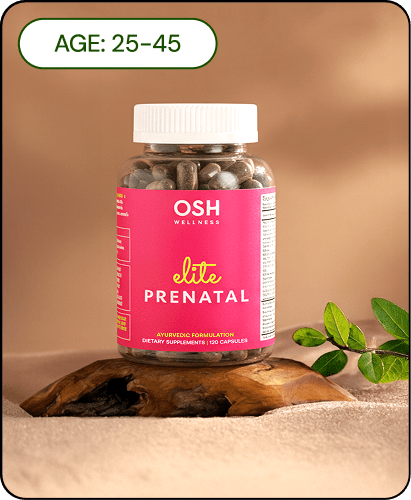Table of contents
Polycystic Ovary Syndrome (PCOS) affects many women, especially between ages 25 and 40, and often shows up as PCOS and bloating, hormonal imbalances, and metabolic challenges. Ayurveda offers a holistic path to manage PCOS and bloating by addressing root causes through dosha balancing, individualized diets, and natural remedies. This article explores how Ayurvedic principles can support women in managing PCOS and related bloating, paving the way for a healthier, more balanced life.
The Ayurvedic Perspective on PCOS

Ayurveda regards PCOS as a complex disorder arising primarily from imbalances in the three doshas, notably an excess of Kapha. This doshic imbalance can cause sluggish metabolism, weight gain, and toxin accumulation (ama), which disrupts the reproductive tissue known as Artava Dhatu. These disruptions hinder the body's natural energy flow and contribute to symptoms such as irregular menstruation and ovarian cysts [1].
Additionally, Ayurveda identifies blocked srotas, channels responsible for reproductive health, as pivotal in PCOS pathology. Disruption of the Artavavaha Srotas impairs hormonal balance and increases the likelihood of cyst formation. Impaired digestive fire (agni) further contributes by allowing ama to accumulate [2].
Management strategies in Ayurveda focus on customized treatments involving diet, lifestyle tweaks, and botanical remedies. Herbs like Ashwagandha and Shatavari are widely used for their ability to support hormonal equilibrium and enhance reproductive well-being. Diet plays an essential role; Ayurveda recommends reducing refined sugars and processed fats to alleviate Kapha-related imbalances [3]. Detox treatments like Panchakarma are particularly effective in clearing toxins and promoting a healthier metabolic state for women dealing with PCOS.
Dosha Imbalances and Their Relation to PCOS Bloating

In Ayurvedic theory, bloating symptoms in PCOS are closely tied to dosha imbalances. Kapha, characterized by its heavy and slow nature, can lead to poor digestion, fluid retention, and weight gain, all of which contribute to bloating [4].
Vata imbalance, characterized by light and erratic attributes, can lead to digestive irregularities, including gas and constipation. In PCOS, Kapha’s stagnation combines with Vata’s volatility to amplify abdominal discomfort, especially during the menstrual cycle [5].
Women often experience both Kapha-dominant and Vata-led symptoms, such as bloating alongside anxiety or irregular digestion. Managing these imbalances involves incorporating warming spices like ginger and turmeric, as well as adhering to dosha-specific dietary plans [6][7].
Ayurvedic Dietary Recommendations for PCOS Management

Dietary management in Ayurveda aims to reduce bloating and support hormonal and digestive health. Eating according to one's dosha constitution is key. Incorporate these nutrient-rich, hormone-balancing dietary suggestions:
Leafy greens and root vegetables (e.g., beetroot, carrots) for essential vitamins and fiber [8]
Healthy fats from nuts, seeds, and cow’s ghee to support reproductive health
Whole grains and legumes to combat insulin resistance [9]
Warm, cooked meals over raw foods for easier digestion
Spices like turmeric and cinnamon aid metabolism and insulin sensitivity [10]
Restricting dairy and high-saturated fats may help minimize inflammation and reduce bloating. A customized dietary protocol, guided by an Ayurvedic practitioner, ensures optimal outcomes [11].
The Role of Herbal Remedies in Alleviating PCOS Symptoms

Herbal therapies are integral to Ayurvedic PCOS treatment. Plants with adaptogenic, insulin-regulating, and anti-inflammatory properties can significantly reduce symptoms like bloating and hormonal irregularity.
Ashwagandha helps lower cortisol and boost adrenal function, promoting hormone regulation and reducing stress-induced symptoms of PCOS [12]
Cinnamon improves insulin sensitivity and helps regulate blood sugar levels, positively influencing menstrual cycles [8]
Turmeric, through curcumin, decreases inflammation and supports hormonal equilibrium [13]
These herbs can be easily integrated via teas, powders, or food. However, consultation with a trained Ayurvedic professional is recommended for proper dosing and effectiveness.
Lifestyle Strategies for Hormonal Balance and Digestive Health

Ayurveda underscores the power of consistency in daily routines and stress management to stabilize hormonal rhythms. Lifestyle strategies include:
Regular exercise, including aerobic and resistance workouts, for improving insulin response and cardiovascular health [14]
Yoga and meditation for lowering cortisol and enhancing emotional resilience [15][16]
Scheduled meals and sleep patterns to reinforce natural rhythms that regulate digestion and menstruation
Mindful eating and hydration are also emphasized as pathways to reduce bloating while supporting metabolic functions. Together, these tools support emotional and physical well-being in women with PCOS.
Integrative Ayurvedic Therapies for Managing Bloating

Integrative treatments like Panchakarma focus on detoxifying the system and restoring gut health. This comprehensive detox routine includes:
Virechana (therapeutic purgation) to eliminate toxins and reduce heat-induced inflammation [1][17]
Basti (medicated enemas) for easing chronic bloating and nourishing reproductive tissues [18]
Other interventions include herbal formulas using Ashwagandha and turmeric to maintain hormonal homeostasis [19]. When combined with lifestyle and dietary adjustments, these therapies holistically tackle the many faces of PCOS-related bloating [7].
Relevant Products
The Osh Wellness Preconception Cleanse is designed to support female reproductive wellness. Infused with Ayurvedic herbs, it assists in hormonal balance and effectively reduces bloating related to PCOS by detoxifying the system.
Conclusions
Viewing PCOS through an Ayurvedic lens allows women to address the syndrome holistically. Emphasizing natural therapies, such as mindful eating, herbal remedies, and lifestyle alignment, leads to meaningful symptom relief. These strategies nurture both body and mind, encouraging sustainable long-term health and balance.
FAQs
What is PCOS and how can Ayurveda help?
Ayurveda manages PCOS by balancing doshas, enhancing digestion, and supporting reproductive health naturally.
Are herbal remedies safe for PCOS?
When used under guidance, Ayurvedic herbs like Ashwagandha and turmeric can be safe and effective.
How does diet influence PCOS symptoms?
Dietary choices directly impact digestion, metabolism, and hormonal balance in PCOS.
What Ayurvedic practices can help reduce bloating?
Practices like Panchakarma, yoga, and warm, nourishing meals help alleviate bloating.
When should I consult a healthcare professional about my symptoms?
Always consult both Ayurvedic and medical experts when symptoms are severe, persistent, or worsening.
Sources
1: PMC - Ayurvedic Perspective on PCOS
2: Medwin Publishers - PCOS: Its Ayurvedic Correlations and Management
3: IJAPR - Ayurvedic Management of PCOS
4: Chakra Kosh - PCOS and Constipation Problem
5: Purusha Ayurveda - An Ayurvedic Approach to Polycystic Ovarian Syndrome
6: Dheemahi Ayurveda - PCOS and Infertility in Women: Ayurvedic Treatment
7: Gynoveda - A Complete Guide to PCOS Treatment in Ayurveda
8: NIH - Cinnamon's Role in Insulin Sensitivity and PCOS
9: NIH - Ayurvedic Remedies for PCOS: A Comprehensive Review
10: Deep Ayurveda - Ayurvedic Treatment for PCOS: What Actually Works
11: Dheemahi Ayurveda - PCOS Ayurvedic Diet and Lifestyle Recommendations
12: NIH - Adaptogenic Effects of Ashwagandha
13: NIH - Turmeric and Its Benefits for PCOS
14: Frontiers in Endocrinology - Lifestyle Changes for Managing PCOS
15: Holistica - Meditation and Yoga in Managing PCOS
16: Frontiers in Endocrinology - Mindfulness-Based Interventions and PCOS
17: JAIMS - Ayurvedic Treatments for PCOS and Menstrual Disorders
18: Ayurvedic Village - Ayurvedic Treatment for PCOD Management
19: Healthline - Ayurvedic Treatment for PCOS








